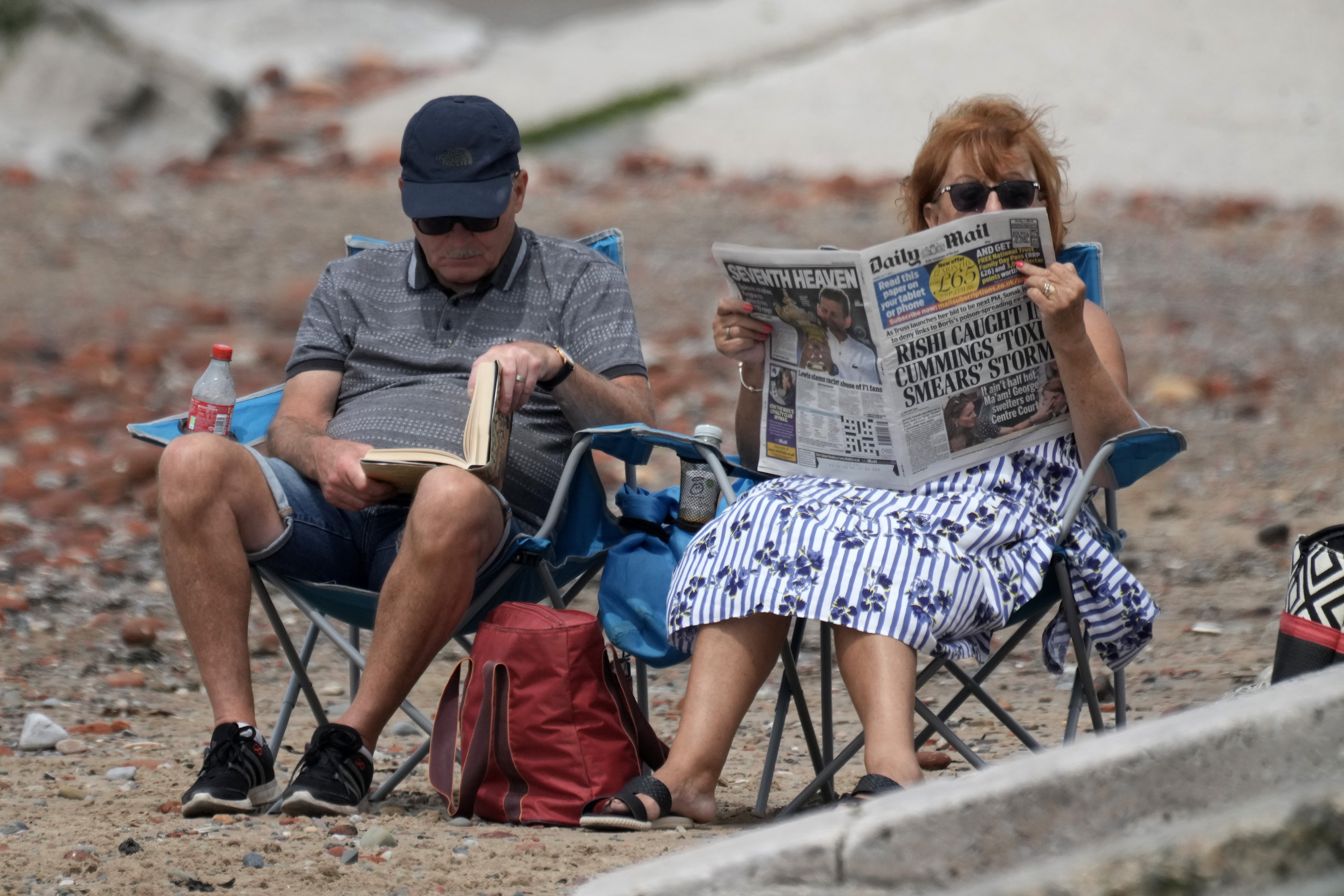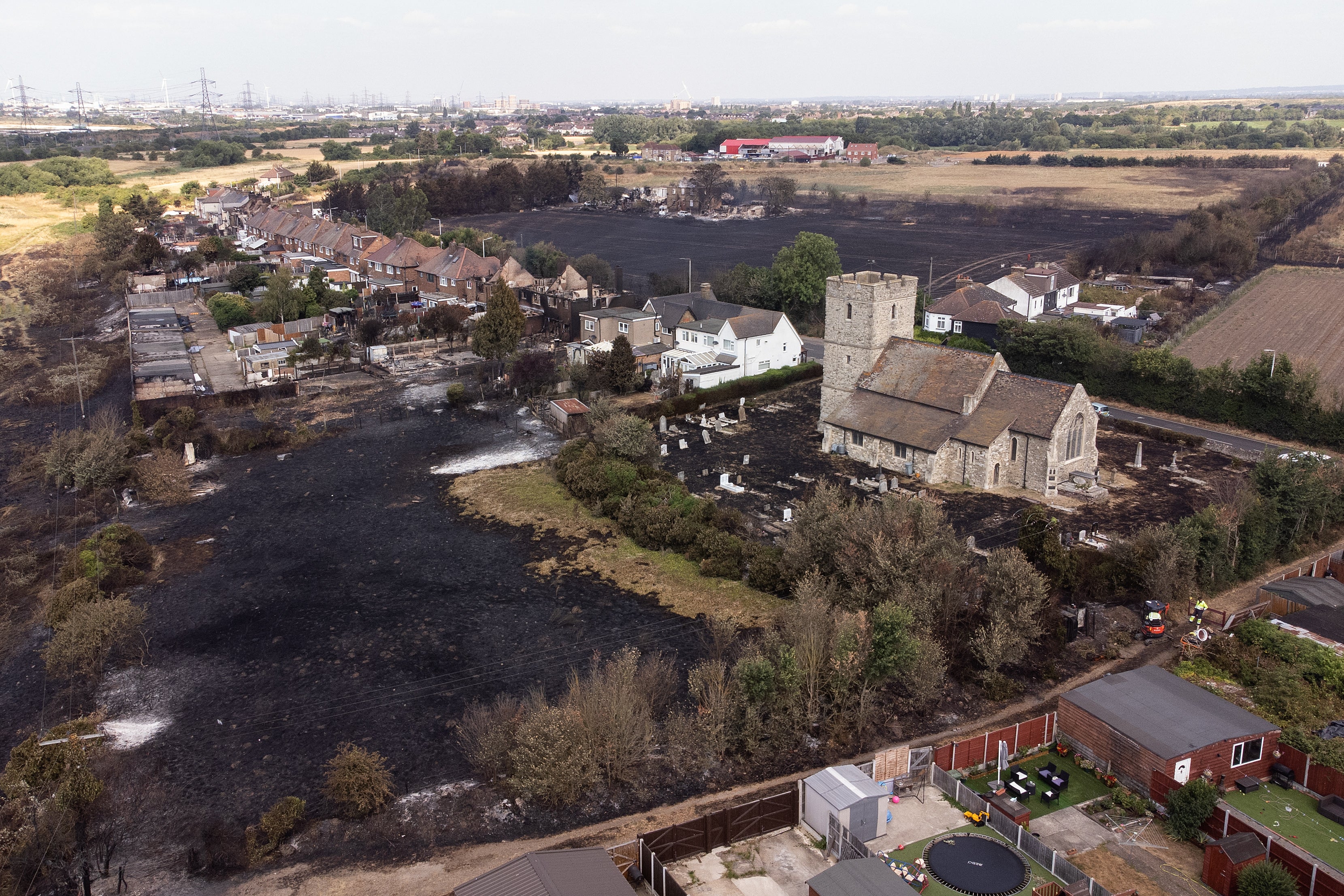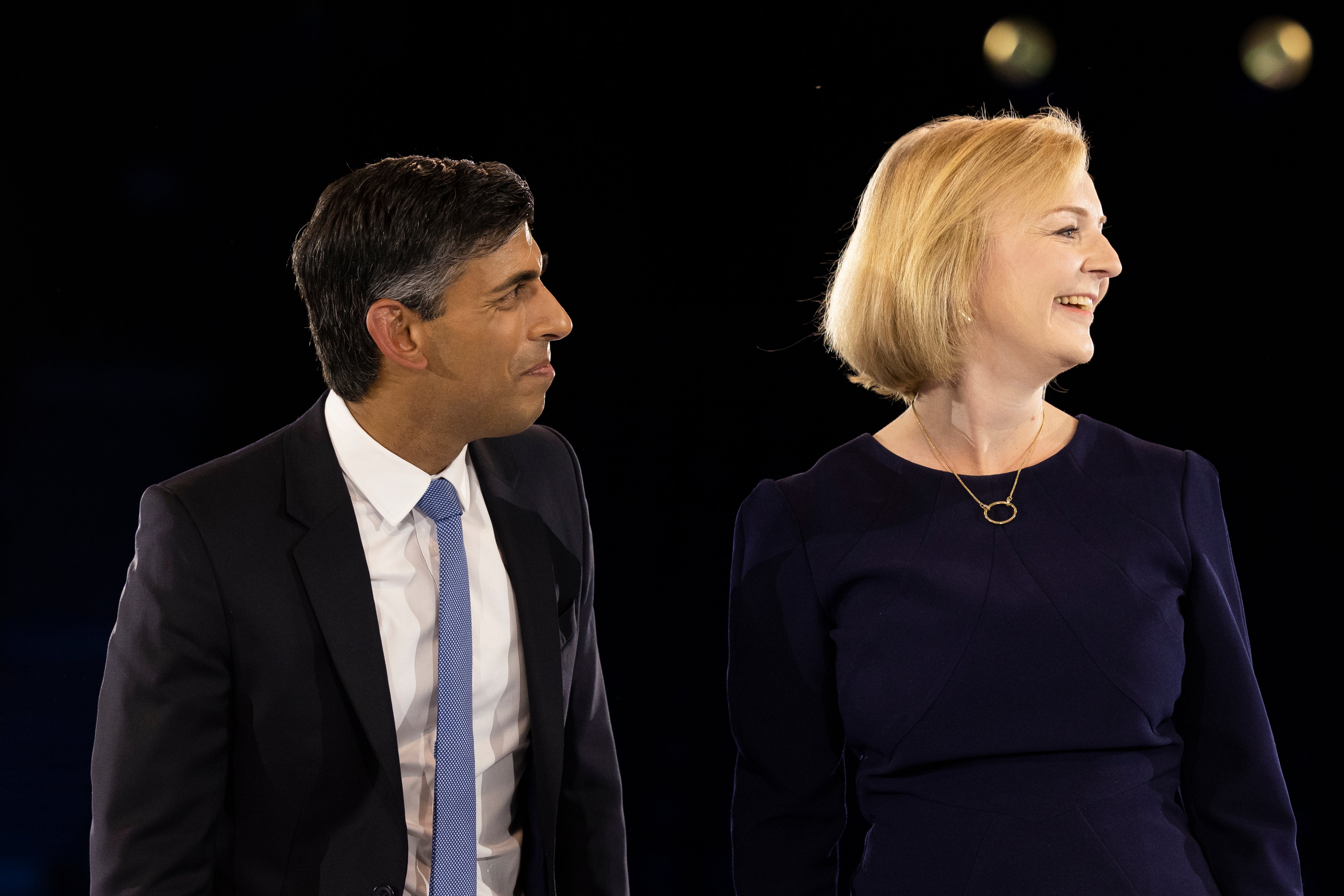In more than 20 years of visiting home, Britain has never looked so weary
As he has lived and worked across a number of countries, most recently the US, Andrew Buncombe has made frequent return trips. His most recent experience left him shocked


The scale of the looming crisis is apparent straight away.
“The country is screwed,” says a friend. “And things are only going to get worse when the new bills come later in the year. People just won’t be able to pay them.”
It has been three years since last visiting the UK, and the overnight flight from Seattle has left me spaced out. It feels like time for bed, but my friends are adamant I hear them out.
“They reckon the bills could be up by as much as 300 per cent. Nobody knows what is going to happen.”
Having left Britain more than 20 years ago, when I return I often feel like a stranger in a strange land. You try to keep up with things that matter – friends and family, football and current affairs – but it is difficult.
The longer you are overseas, the more you become accustomed to events in your adopted home. The news there feels important and dramatic, while happenings in the place you left can feel distant and parochial.
One consequence is that when you do return, the news comes at you like a sharp jab. During the last few visits, people appeared to be in each other’s faces over Brexit with an intensity (sometimes anger) I had not seen.
Few people seemed able to agree to disagree and walk away. It appeared more as if one side literally could not comprehend why the other side felt the way it did. Friends fell out.

It reminded me of the passions stirred by Donald Trump here in the US. During the controversial presidency of George W Bush, whose bombing of Iraq led some people to claim they were moving to Canada, Democrats and Republicans could sometimes sit and talk to each other. Not so with Trump; he invokes the same intensity of passion – and mutual incomprehension – as the debate over Brexit.
Americans would say to me, “You must think we’re all mad”. They still say that but they add, “But I see you’ve got problems back home as well.”
On this trip, nobody mentions Brexit; nothing significant is happening in regard to Britain’s separation from the European Union in the even medium-term future. The situation is wedged shut.
But the anxiety over fuel bills, soaring inflation and looming economic crisis feels real and present. Partly because the numbers being talked about seem so extraordinary. Economists predict inflation could reach more than 13 per cent by the end of the year and hit 18 per cent next year –and nobody thinks the modest pay rises being given to those in the public or private sector are going to cover that.
Another cause for anxiety is that nobody appears to have any faith that Britain’s political leadership has any clue about how people are suffering, or how to address it. Tax cuts for those who have jobs – the main proposals offered by Liz Truss and Rishi Sunak, the Conservative Party candidates to be the nation’s next prime minister – feel like they are only going to help a very select few. Many appear insulted by the ideas.
In truth, Britain is facing multiple crises all at the same time. Alongside the economic woes and political haplessness, it is also facing the knock-on effect of Russia’s invasion of Ukraine. A war launched six months ago and which has resulted in the deaths of many Ukrainian civilians, and thousands of troops from each side. It has also pushed up the price of natural gas and food.
And there is something else playing out in Britain, one more existential challenge to the nation that is also strikingly apparent as I land at the end of a hot August: that of the climate crisis.
Earlier this year London’s Heathrow airport recorded a temperature of 40.2C (104.4F ), and a nation that has few air conditioners, and homes built without much of a thought for shade or ventilation or insulation, struggled to cope. For some, the challenge appeared psychological as well as physical; this is not how it is supposed to be, people grumbled. Adaptation will take time and money.
But even if air conditioners were more widespread like in the US, many would fear using them, given the already enormous fuel bills. Charities have warned this coming winter, many low-income households, particularly the elderly, will have to confront the question of whether to buy food or turn on their heating.
Most dangerously, these various crises are happening at the very same time because they are interrelated. Addressing one requires addressing all of them. But nobody seems to have a plan.

The Holy Trinity Church in Blythburgh sits on a site said to date to AD654. The village is one of the oldest Christian sites in East Anglia and is apparently known as the “Cathedral of the Marshes”. The church sits on the A12 and marks the turn-off to the seaside town of Southwold.
Alongside those pilgrims who may have been guided by its edifice in days gone by, its tower has been a crucial marker for the past 30 years for me and my friends, who try to gather here every summer. Some of them grew up in villages on the edge of the long-gentrified town, whose streets can feel like a film set.
This year, the woods that line the road into town are a jolting sight – dried out and a deep, dark brown, the colour of dark roasted coffee. It feels like a single spark would set them alight. The ancient landscape feels as weary as its occupants.
One friend’s husband is a builder, another works for social services. There is a publican and a schoolteacher, and an engineer who has arrived from Texas, reflecting on the irony that Suffolk is as hot as Houston. No one can remember it having been this dry, nobody can remember so many things pressing down at once. And nobody sounds very optimistic.
One friend’s father is a lifelong Labour man, whose personal politics are probably some way to the left of the party’s centre. It is always fun to chat politics with him – Tony Blair, Jeremey Corbyn, now Keir Starmer. Starmer is not bad, he says, but the media doesn’t seem to give him much coverage, especially compared to the dramas of Boris Johnson and others in the Tory party.
And who does he think will win the Conservative’s leadership election? “I’d like to think it would be Rishi Sunak,” he says, but predicts a Truss win. “I don’t like either of them, personally.”
He predicts that sadly the grassroots of the Tory party is more likely to elect a white woman, than a man of Asian heritage. “I wish it was not’t the case, but I think it is.”
The sea is unseasonably warm. Usually swimming in the North Sea off the coast of Southwold is an opportunity to display childish bravado by plunging in the cold, grey water. Today the sea feels warm. So warm that there are jellyfish.

So much for anecdotes, what about some data?
According to Gallup, the usually chippy British are less optimistic about their standard of living now than they were even during the height of the last big recession in 2007-09. The polling company found that 42 per cent of Britons felt their standard of living was getting worse, with a record low of just 28 per cent saying theirs was getting better.
The International Monetary Fund (IMF) says the UK is poised to have the slowest growth of the world’s seven richest economies next year, just 0.5 per cent.
“The global economy, still reeling from the pandemic and Russia’s invasion of Ukraine, is facing an increasingly gloomy and uncertain outlook,” economist Pierre-Olivier Gourinchas wrote in a blog post attached to the international body’s latest forecast.
And there is more gloom. At the end of August, Britain’s energy regulator, Ofgem, said residents will see an 80 per cent jump in average annual household energy bills, following on from a record rise of 54 per cent in April. The energy price cap will be £3,549 from next month, as winter begins to set in.
The charity Age UK has warned that many elderly people, in particular, will struggle to make ends meet. “We fear that because fuel prices will be so high, some older people will skip meals and switch off their heating to try to save money, putting their health at serious risk. It’s not hyperbole to suggest that some could die as a result – and that’s something we would never say lightly,” director Caroline Abrahams has said.
What does the data say about people’s concerns about the climate crisis and the way that is upending life?
A poll commissioned by YouGov found that after the record-breaking heat, the number of people selecting “the environment” as one of the most important issues facing the country rose by 10 percentage points, to 33 per cent. As many as 67 per cent say they are worried about the impact of climate change, with women markedly more worried than men.

Fifteen fire departments declared major incidents as more than 60 properties around the country were destroyed on a single day in July.
A large fire broke out in the town of Dartford, a community on the edge of London, where flames took hold alongside the A2 carriageway. We take that road into London after leaving Southwold, and where the fire took hold there is now black ash.
London always feels hot. Even before the heatwaves of the last few years, a warm day in the airless, breezeless capital often feels like hard work. There’s not enough shade, not enough drinking fountains and not enough fans.
These days, with seven of the 10 hottest temperatures in UK history having been noted and recorded since 2003, there’s an even greater need for people to get ready to adapt and prepare for more extreme weather.
Onto Covid-19. On the London Underground, it feels to me like few people are wearing face coverings. Daily Covid infections in August were down to less than 100,000 from a high of 351,546 in July.
But experts such as Tim Spector, of King’s College London, are warning that this plateau could mark a pause before infections soar in the autumn as more people are back inside. “This may be the calm before the storm; when we should be preparing for winter,” Spector told the i newspaper.
There’s a sense that most people have had it and may get it again, multiple people tell me. But with the vaccines available – 75 per cent of the population is said to be fully vaccinated – people assess it is unlikely to send them to hospital. Those that are worried are most likely those with the masks.
“People can’t be bothered. They want to get on with their lives”, one friend says.
One night our friend in south London hosts a party for friends we made while on assignment in India, seven very special years during which we learned to consider temperatures of 100F as blessed relief from the even crazier days of white-heat insanity that descend in late May and June, though earlier this year.
There is talk of friends who could not make it, politics, the fudge over Brexit, the number of businesses who claim they cannot get staff, and the transformation of cut-price stores such as Aldi and Lidl from a novelty for the middle classes to everyday necessity. People also grumble that the National Health Service – an institution about which I would routinely brag to Americans – is under pressure like never before. Britons often say the NHS lacks resources, but data shows waiting lists are at an all-time high.
One friend, originally from Venezuela, says Britain’s inflation – Citi Bank has estimated it will hit 18 per cent by next year – reminds her of what she used to experience back home, and the type of existential problems her parents face.
“I’ve seen this before,” she says.
One of my very favourite things about Weston-super-Mare is a painting by the artist William Sennett.
It was drawn in 1940, with a woman stylishly dressed in a bathing costume, swimming cap and gown, standing on the beach. A seagull is carrying a glass filled with a drink that matches the woman’s bathing suit, and the bird is holding the coupe at an angle that allows her to sip effortlessly.
It is captioned, “Weston-super-Mare – Air like Wine”. A note on the poster indicates that anyone wanting more information about this beautiful seeming location contact the offices of the Great Western Railway for England, located at 505 Fifth Ave, New York City.

I was born in Weston and grew up nearby. I long suffered the jokes about the sea that was always a mile away – it has the second-biggest tidal range in the world, 15 meters, and is second only to Canada’s Bay of Fundy at Burntcoat Head in Nova Scotia – and that the estuarine waters of the Bristol Channel were far from enticing.
Once I learnt of the poster, with a touch of the Jazz Age, I delighted in telling people that not so long ago, wealthy Americans preparing for transatlantic journeys on luxury vessels such as the RMS Queen Mary were then planning to hit my hometown. A lot changes, a lot stays the same. The area is still where my family live.
I consulted them on the crises confronting Britain. “Everything just seems to be going wrong at the same time,” a cousin says.
An elderly relative voted for Brexit, lured by Boris Johnson’s bubbly manner and a promise of millions of additional pounds for the NHS. Has she noticed any change?
“No. There has been no change,” she says.
One constant, from all and sundry, was that nobody seemed to have a long-term plan, if they had a plan at all. In Seattle, and elsewhere in Washington State, where I am based, around 90 per cent of energy is from renewable sources.
The vast bulk of that is from hydroelectricity and makes use of public works such as the Grand Coulee Dam on Washington’s Columbia River, built in the 1930s and opened in 1942, but which may not have received the green light in its current form were it built today.
If Britain is to break away from its dependence on fossil fuels and those countries that have them as a major part of their economy, like Russia and Saudi Arabia, it requires big-picture thinking on the scale of the New Deal vision of the likes of President Franklin Roosevelt.
I think Britain might, in the medium term, require more nuclear power stations but they should be attendant to major investment in wind, solar and geothermal power. No single solution will fit the bill, but the efforts could run from grassroots initiatives like sticking solar panels on the roofs of all schools to wind farms in the Bristol Channel.

Indeed, for as long as I can remember, there have been plans for a barrage on the Severn estuary, up from Weston, that could be transformational for Britain.
Such an investment would likely create jobs in the short and long term, help the world address the climate crisis, and provide a sense of purpose and meaning to those involved.
On my last night in Britain, I walk along the newly strengthened sea wall in Weston-super-Mare, and think about all the potential renewable power sitting right in front of me.
What year will we end up comparing 2022 to? Will it be the long hot summer of 1976 that scorched the land and embedded itself in the memories of those old enough to remember? Or will it be like 1997, when after almost 20 years of Tory governance, and frequent misrule, voters opted for a change?
Perhaps we will remember it for something else – as the year that Britain and its leaders saw the multiple crises impacting them, and started collaborating on a plan that will help not just this generation, but those to come.
That, truly, would be something to think about.






Join our commenting forum
Join thought-provoking conversations, follow other Independent readers and see their replies
0Comments